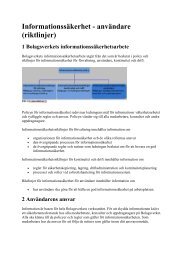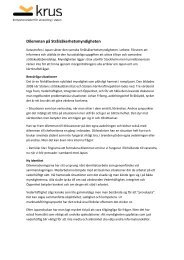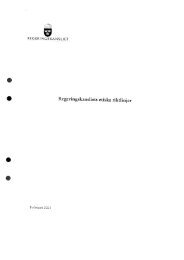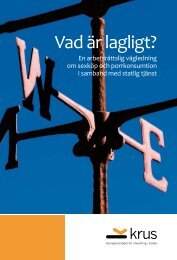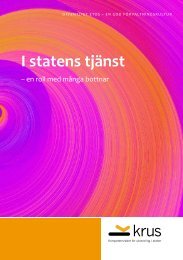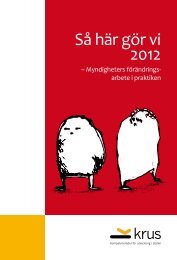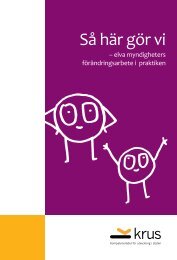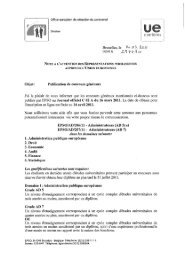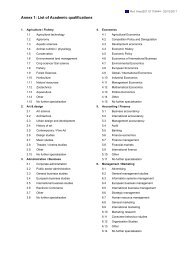Dialogkompetens i skolans vardag - Publikationer - LTU - Luleå ...
Dialogkompetens i skolans vardag - Publikationer - LTU - Luleå ...
Dialogkompetens i skolans vardag - Publikationer - LTU - Luleå ...
You also want an ePaper? Increase the reach of your titles
YUMPU automatically turns print PDFs into web optimized ePapers that Google loves.
Listening Environment in School 5<br />
encourage. Adelmann (2002) points out that the listening aspect is neither<br />
integrated in the Swedish curriculum, nor in practice, and has called for more<br />
experiences and knowledge about taking the role of listener in classroom<br />
communication as a part of the learning process.<br />
In the past, generally speaking, a student with a hearing loss was taught<br />
how to be a speech producer. Assumption of the role of listener was taken for<br />
granted, or at least the skills needed to be an active response giver were very<br />
much a secondary consideration (Wennergren 2006). Listening and providing<br />
a response is, however, just as important as speaking for participating in a<br />
learning dialogue. Participation is a cooperative activity for constructing<br />
meaning together. Liberg (2003) stresses the importance of learning being<br />
seen as a social activity in which meaning is constructed together with others.<br />
Hence, the degree of awareness of the effects of a hearing loss will influence<br />
communicative participation, as well as the pupil’s own self-image and<br />
identity. According to Bergöö and Ewald (2003), participation in communities<br />
is a determining factor for the development of identity and self-image.<br />
Coping strategies connected to persons with a hearing loss are seen as<br />
opportunities for action to reduce the effort involved in listening. They might<br />
also be seen as guiding life towards gaining control, whilst, at the same time,<br />
providing a relaxed feeling. The process of learning how to handle life, for the<br />
purpose of satisfying one’s needs, can be described as a form of empowerment<br />
and provides autonomy and control of one’s life situation (Gullacksen 2002,<br />
Lazarus & Folkman 1991). Empowerment gives the individual the strength to<br />
implement adjustments and participate in communities. One problem with<br />
the traditional classroom format described by Wenger (1998) is that it is both<br />
too disconnected from the world, and too uniform to support meaningful<br />
forms of identification:<br />
If an institutional setting for learning does not offer new forms of identification and<br />
negotiability that is, meaningful forms of membership and empowering forms of<br />
ownership of meaning then it will mostly reproduce the communities and economies<br />
of meaning outside of it (Wenger 1998:269).<br />
Applied in a setting with pupils who have a hearing loss, the experience of<br />
taking an active role as a student is not only important in achieving a<br />
meaningful learning situation, but a necessity for empowerment.<br />
Method<br />
This study was a part of an action research project in which 50 teachers from<br />
five different compulsory schools participated. The project ran for three years<br />
and the overall aim was to improve the learning environment for pupils who<br />
need hearing aids and/or technical equipment. In action research projects the<br />
participants are actors during the process and the design of this study has,<br />
according to the action research philosophy, been developed during the<br />
teachers’ own changes in their practices. In such an approach research<br />
outcomes and the applications of results to problem-solving are inextricably<br />
linked (Greenwood & Levin 1998). The process of action research can be



